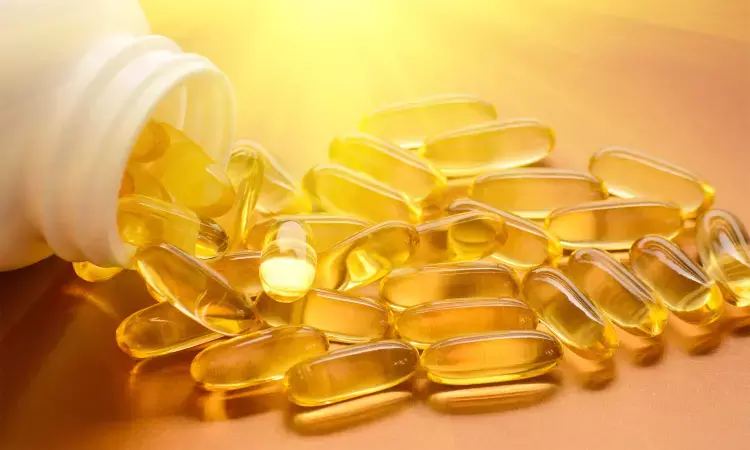- Home
- Medical news & Guidelines
- Anesthesiology
- Cardiology and CTVS
- Critical Care
- Dentistry
- Dermatology
- Diabetes and Endocrinology
- ENT
- Gastroenterology
- Medicine
- Nephrology
- Neurology
- Obstretics-Gynaecology
- Oncology
- Ophthalmology
- Orthopaedics
- Pediatrics-Neonatology
- Psychiatry
- Pulmonology
- Radiology
- Surgery
- Urology
- Laboratory Medicine
- Diet
- Nursing
- Paramedical
- Physiotherapy
- Health news
- Fact Check
- Bone Health Fact Check
- Brain Health Fact Check
- Cancer Related Fact Check
- Child Care Fact Check
- Dental and oral health fact check
- Diabetes and metabolic health fact check
- Diet and Nutrition Fact Check
- Eye and ENT Care Fact Check
- Fitness fact check
- Gut health fact check
- Heart health fact check
- Kidney health fact check
- Medical education fact check
- Men's health fact check
- Respiratory fact check
- Skin and hair care fact check
- Vaccine and Immunization fact check
- Women's health fact check
- AYUSH
- State News
- Andaman and Nicobar Islands
- Andhra Pradesh
- Arunachal Pradesh
- Assam
- Bihar
- Chandigarh
- Chattisgarh
- Dadra and Nagar Haveli
- Daman and Diu
- Delhi
- Goa
- Gujarat
- Haryana
- Himachal Pradesh
- Jammu & Kashmir
- Jharkhand
- Karnataka
- Kerala
- Ladakh
- Lakshadweep
- Madhya Pradesh
- Maharashtra
- Manipur
- Meghalaya
- Mizoram
- Nagaland
- Odisha
- Puducherry
- Punjab
- Rajasthan
- Sikkim
- Tamil Nadu
- Telangana
- Tripura
- Uttar Pradesh
- Uttrakhand
- West Bengal
- Medical Education
- Industry
Vitamin D toxicity may present as Cortical Venous thrombosis: Case study

Vitamin D is a pro hormone and has a crucial role in bone and calcium metabolism, and various biological functions like immune modulation, cell differentiation etc. It is important to maintain adequate blood levels of Vitamin D but excess intake may lead to Vitamin D toxicity.
Clinical features of vitamin D toxicity are mainly related to hypercalcemia.Vitamin D toxicity presents as muscle weakness, nausea, headache, vomiting, constipation, polyurea and polydipsia and acute renal failure.Despite of protective role in thrombosis, occurrence of Cortical Venous thrombosis in setting of hypervitaminosis D is an unusual presentation.
Dr Anjali Rajadhyaksha Professor and Head of Unit, Seth G.S. Medical College and KEM Hospital, Mumbai, Maharashtra and colleagues have reported an unusual presentation of Vitamin D toxicity as Cortical Venous thrombosis.
In her recent case study published in the Journal of the Association of Physicians of India(JAPI, September 2020)she and her colleagues studied a 65-year-old male who presented to them with complaints of altered sensorium for 1 day, nausea, giddiness, and persistent vomiting for 15 days. There was no h/o fever, decreased urine output, and dyspnea. He was not a known case of any major illness like diabetes mellitus, hypertension, and ischemic heart disease.
A complete body workup including central nervous system examination, Gastrointestinal, respiratory and cardiovascular system examination, blood investigations, liver function tests, urine routine and microscopy, immunological workup, USG abdomen, ECG records, protein electrophoresis and bone marrow examination, serum parathyroid levels, vitamin D levels and whole-body CT scan were done but to their surprise but no abnormalities were detected.
However, a detailed history from the patient after regaining consciousness on day 3 revealed that he had persistent backache for which he had taken 15 injections of vitamin D 6 Lacs IU intramuscularly along with once week chewable cholecalciferol tablets for 6 months. So, he was diagnosed as CVT with acute renal failure with hypercalcemia secondary to iatrogenic hypervitaminosis D.
His CVT was managed with anticoagulation. His hypercalcemia was treated with hydration, calcitonin, steroids and Zoledronate.
It has also been demonstrated that vitamin D receptors may play an important role in thrombosis. "Despite a protective role in thrombosis, the occurrence of Cortical Venous thrombosis in the setting of hypervitaminosis D is an unusual presentation and taking a diligent history in such cases is a must.", says Anjali Rajadhyaksha, Professor and Head of Unit, Seth G.S. Medical College and KEM Hospital, Mumbai, Maharashtra.
The researchers further discussed that in elderly patients, excessive intramuscular injection is not an uncommon cause. Many times vitamin D is prescribed empirically without estimating serum vitamin D levels owing to its high cost. "Though there is no direct association of hypervitaminosis D with CVT, but hypervitaminosis D leading to hypercalcemia causing dehydration and acute kidney injury seems to be the cause of CVT in our patient", states Anjali.
Therefore, the authors concluded that diligent history taking is an essential step before confirming the diagnosis in any patient.
Dr. Nandita Mohan is a practicing pediatric dentist with more than 5 years of clinical work experience. Along with this, she is equally interested in keeping herself up to date about the latest developments in the field of medicine and dentistry which is the driving force for her to be in association with Medical Dialogues. She also has her name attached with many publications; both national and international. She has pursued her BDS from Rajiv Gandhi University of Health Sciences, Bangalore and later went to enter her dream specialty (MDS) in the Department of Pedodontics and Preventive Dentistry from Pt. B.D. Sharma University of Health Sciences. Through all the years of experience, her core interest in learning something new has never stopped. She can be contacted at editorial@medicaldialogues.in. Contact no. 011-43720751
Dr Kamal Kant Kohli-MBBS, DTCD- a chest specialist with more than 30 years of practice and a flair for writing clinical articles, Dr Kamal Kant Kohli joined Medical Dialogues as a Chief Editor of Medical News. Besides writing articles, as an editor, he proofreads and verifies all the medical content published on Medical Dialogues including those coming from journals, studies,medical conferences,guidelines etc. Email: drkohli@medicaldialogues.in. Contact no. 011-43720751


